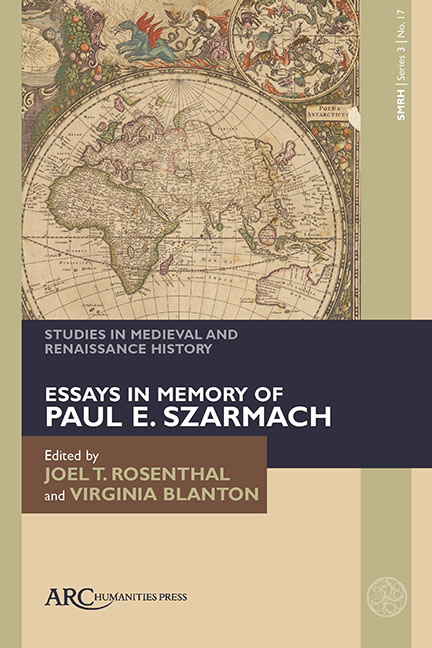Book contents
- Frontmatter
- Contents
- List of Illustrations
- Introduction
- Memories of Viking Age Cultural Contact: England in the Íslendingasögur
- Expressions of Cultural Disability: Navigating (Non)Normativity in the Hebrew–Italian Melekh Artus (King Artus)
- “All the rancour and enmity between us”. The War Between Richard, Earl Marshal, and King Henry III: Its Origins and Resolution
- Royal Consumption and Gifts of Deer in Thirteenth-Century England
- Travers and Trappe in the Palace of Pandarus: A Note
- Benedictine Devotion to England’s Saints: Thomas de la Mare, John of Tynemouth, and the Sanctilogium in Cotton Tiberius E. i
- The Rise of Admission by Apprenticeship Among the Freemen of Norwich, 1365–1415
- Nuns on the Run, or the “Sturdy and Wilful Dames” of Syon Abbey and their Disobedience to the Tudor State ca. 1530–1600
- Taking the Tour: Heritage Management in A Connecticut Yankee in King Arthur’s Court
Expressions of Cultural Disability: Navigating (Non)Normativity in the Hebrew–Italian Melekh Artus (King Artus)
Published online by Cambridge University Press: 13 February 2024
- Frontmatter
- Contents
- List of Illustrations
- Introduction
- Memories of Viking Age Cultural Contact: England in the Íslendingasögur
- Expressions of Cultural Disability: Navigating (Non)Normativity in the Hebrew–Italian Melekh Artus (King Artus)
- “All the rancour and enmity between us”. The War Between Richard, Earl Marshal, and King Henry III: Its Origins and Resolution
- Royal Consumption and Gifts of Deer in Thirteenth-Century England
- Travers and Trappe in the Palace of Pandarus: A Note
- Benedictine Devotion to England’s Saints: Thomas de la Mare, John of Tynemouth, and the Sanctilogium in Cotton Tiberius E. i
- The Rise of Admission by Apprenticeship Among the Freemen of Norwich, 1365–1415
- Nuns on the Run, or the “Sturdy and Wilful Dames” of Syon Abbey and their Disobedience to the Tudor State ca. 1530–1600
- Taking the Tour: Heritage Management in A Connecticut Yankee in King Arthur’s Court
Summary
PAUL SZARMACH FIRSTchanged medieval studies from his position at SUNY Binghamton and then from his seat in Western Michigan. I met Dr. Szarmach in April 1996 when I attended, as a graduate student just beginning her doctoral studies, the Seventh Annual Conference of Romance Languages and Literatures at SUNY Binghamton. I delivered a paper on Sir Gawain and the Green Knight that reflected on Gawain's being designated the “pentangle knight,” carrying about him the mark of þe pentangle nwe that denotes þe endeles knot, trawþe, and circles back to King Solomon. Fascinated by the discovery that “pentangle” appears for the first time in Middle English in SGGK, I intended to work on an argument for both this paper and then later for my dissertation that linked the pentangle as expressing a type of temporal infinity that circled back to the Jewish Magen David or six-pointed star. In the late 1990s, I had also started developing an interest in postcolonial and critical race studies that figured in the backdrop of my paper. I remember Dr. Szarmach's offering me suggestions about the paper's future directions, though my doctoral studies later turned more forcefully toward Jewish Studies and the work of such writers as Meir ben Elijah of Norwich. Rather than digging up and attempting to update the SGGK paper to honor him, I have decided to contribute a different essay about another Arthurian text: the Hebrew–Italian, Melekh Artus, or King Artus. The essay that follows serves as my expression of gratitude for Paul Szarmach's commitment to Medieval Studies. May his memory be for a blessing.
Melekh Artus is an unusual text that captures a remarkable episode in medieval Jewish culture. Sometime around 1279 in the A.D. calendar or 39 in the Jewish calendar, a writer, author, or scribe—all roles apply to the translator who worked on this Hebrew-Italian Arthurian Romance—Jewished or translated a now lost, Christian romance. Beginning with the Melekh-author's revealing that he suffers from psychological disabilities, Melekh Artus then takes some more introductory space in the text to discuss and make an argument for the value of secular stories in affording audiences a site where they can access intellectual and psychological healing.
- Type
- Chapter
- Information
- Studies in Medieval and Renaissance History series 3 volume 17Essays in Memory of Paul E. Szarmach, pp. 27 - 38Publisher: Amsterdam University PressPrint publication year: 2023



